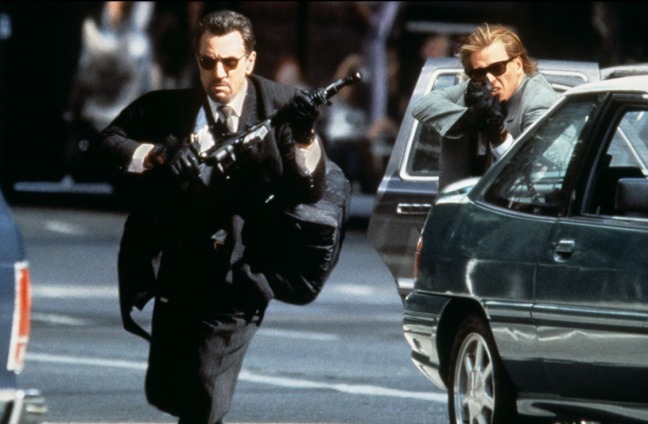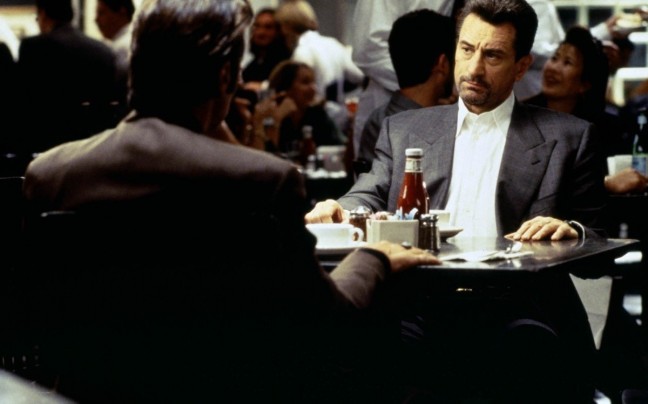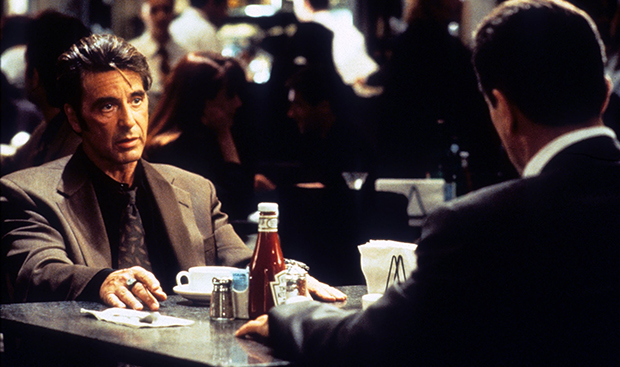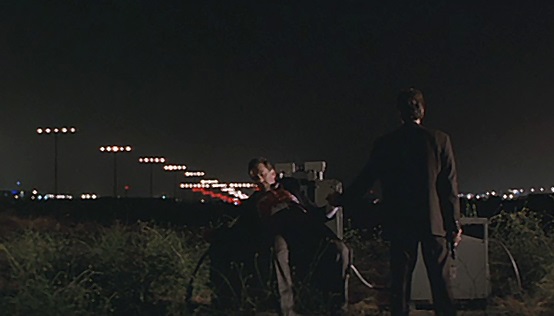This week’s film analysis, or as I now like to call it, the Weekly Mental Health Series, deals with a film that is not related to mental health. Heat, a 1995 Michael Mann crime drama starring Al Pacino and Robert de Niro, is a film that is long but doesn’t feel long, mostly because it is so damn good.
The central idea of Heat is to try and define the line between cop and criminal, or rather, to highlight how blurred this line is. Robert de Niro plays Neil McCauley, a criminal who is especially good at being in the dark with his operations. Al Pacino plays Vincent Hanna, a police lieutenant who specialises in taking down the best of criminal organisations. What’s the result? Excellence.
As usual, here’s a spoiler warning for the entire film.
Something anyone who watches this movie notices is that both men are not so different. In fact, one could argue that de Niro’s character is more fitting as a good guy, and Pacino’s as a bad. The first time we see de Niro, he’s taking a train, like any normal, everyday person, and then gets in an ambulance and drives away. The first time we see Al Pacino, he’s making love to his wife and seems like a very happy man. It’s only later on that we learn that de Niro steals the ambulance for a robbery, and that Al Pacino’s wife is in fact his third. The movie initially makes us believe that they are not extreme characters, but rather, normal people.
And when I say extreme characters, I mean it. While both men are certain about what they do, it’s how they are that can perplex a viewer. Al Pacino is dangerously charismatic, almost to the point of comical, while Robert de Niro is calm, collected and carries out his operations in a more civilised manner. Any outsider could mistake them for each other, as one characterises a criminal and the other cop, while both are in fact opposites.
One instance in the film where the movie really asks you question your perception of both men is the infamous bank robbery scene. As Robert de Niro and his men steal the bank’s money, de Niro oddly tries to calm everyone in the bank down, almost as if he cares for their well being. After they finish the job and are escaping, the police catch up and a long street shootout takes place, at the culmination of which de Niro’s right hand man Chris Sheherlis (played by Val Kilmer) gets shot and almost killed. McCauley risks his own life to save him and get him to a safe spot, proving how loyal he is to his men, something usually associated with the police or even the military.

This is a particularly strong irony since Kilmer’s character is a pushover who constantly disappoints everyone in his life, and so he doesn’t have much value to be saved, other than true loyalty.
On the other hand, throughout the course of the film, we see underground connections that Al Pacino’s character has, something that a criminal usually has. He uses these connections to catch criminals, but the fact is that he still uses them.
Coming back to de Niro and Pacino, both men play off each other wonderfully. While Vincent Hanna has had two failed marriages, he still tries to keep his third one together despite being wholly committed to his job. Neil McCauley, meanwhile, has never been in a relationship but develops one during the events of this movie.
What is interesting is that both have to make similar choices in this film. They both have to choose between their work and their partner. And it isn’t conventional either. Al Pacino’s character chooses his work. Robert de Niro’s character chooses his partner, and decides to leave to New Zealand with her to start a new life.
This is interesting because it is usually the opposite that is associated with both men. The criminal’s greed gets the best of him and so he continues to commit crime for the reward. The cop’s attachments to his family are far too strong to take the place of his work. This movie really makes you think about the actual people who play the roles of good and bad. More about both men’s choices later on. Something to note about this is Al Pacino’s wife’s daughter, played by Natalie Portman, who feels entirely neglected throughout this entire movie.
Towards the end of the film, both men have to go to a hotel room; Al Pacino to find out from someone where to find a criminal (who is an ex-associate of de Niro’s); and Robert de Niro to find the very man the police are looking for and kill him. De Niro does, of course, kill this man point blank, but what is most intriguing is that when Al Pacino tries to get information from the person in his hotel room, he doesn’t hesitate in harming him, and seems to be enjoying it.
This is exactly where the film peaks with its idea that both men aren’t that different. While their motivations for their actions were different, they both caused harm without remorse. Who’s really the bad guy?
Now, finally, I’ve come all this way without talking about that scene in the restaurant.

Midway through the film, Al Pacino finds de Niro and asks him to go out for coffee. So they do.
This was not their first encounter. Both men had stared at each other earlier, although one of them didn’t know it at the time. During a robbery, Al Pacino and his men are undercover in a van and observing, when one of them accidentally makes a noise and de Niro notices. Both men stare at each other, through camera and screen, and it is clear that they develop respect for each other. One for being able to find him despite trying so hard to be hidden; one for being able to so quickly evade being caught.
So when both of them sit down together to have a conversation, they already respect each other. Both of them know the other will not do anything to harm them. And so they converse about each other, as if they were old friends. The biggest thing evident from this scene is how much both of them love what they do. Even though they end this conversation by threatening each other, they know that both of them love to play this game. Both of them really need each other.
During this conversation, Pacino asks de Niro if he would abandon his girlfriend if he had him cornered, and he says yes. Keep that in mind.

Towards the end of the film, it appears as if McCauley is going to get away, and Hanna has given up. The latter goes back to his hotel room (he has moved out after a fight with his wife) to find his stepdaughter bleeding out in the bathtub. He rushes her to the hospital and has a moment of closure with his wife, and everything seems fine with them.
Meanwhile, de Niro is about to leave town when he realises that he can kill his ex-associate who betrayed him, because he knows which hotel he’s in. He tells his girlfriend he’ll be back soon, and does the job.
When he’s leaving, Al Pacino is at the scene, and a chase ensues, with de Niro leaving his girlfriend behind, staying true to his word from the restaurant scene.
While Hanna chose his work over his wife, and McCauley chose his girlfriend over his work, ultimately, the cop found closure with his wife, while the life of crime called back to the criminal. In the end, good pays and bad, after all the reward, comes with a price.
An intense chase takes place at an airport, which ends with both men being one shot away from death, and Al Pacino comes out on top. He stands over de Niro, and both men hold hands as he dies. Hanna has won, but he seems disappointed. He looks like he’s losing an old friend. McCauley dies holding the hand of his killer. Both men share one emotion. Respect.

The image above is the final shot of the film, and it really says a lot. De Niro, dead, the criminal, is facing us. He is open about his crime and his bad acts. He knows he is a criminal and doesn’t hide this fact. Al Pacino may be alive and standing, but he facing the other way. He is the cop, but he is also bad in his own ways. He also does things that are shady, that are to be looked down upon, but he doesn’t do things he shouldn’t in the open. He is still good. But there is a side to him that definitely isn’t.
Heat is an incredible film in which Robert de Niro and Al Pacino share very little screen time, but both make it an enthralling experience through their performances and a great script that subtly highlights the characteristics of both men, to allow an audience to think about their definitions of good and bad.
